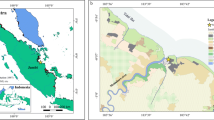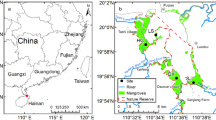Abstract
Mangrove habitats on Kosrae are divided into three types, i.e., an estuary or delta type, a backmarsh or lagoon type and a coral reef or tidal-flat type. Most of the mangrove forests of Kosrae have been developed during the last 2000 years by accumulating mangrove peat with the gradual sea-level rise of 1 to 2 mm/yr except the landward part of the estuary or delta type. On the other hand, during the period of rapid sea-level rise of about 10 mm/yr between 4100 and 3700 yr B.P., the mangrove forests ceased peat accumulation and retreated landward. Until 3500 yr B.P., mangrove forests were distributed only in narrow bands in the inlets. Therefore, the critical rate of mangrove peat accretion with sea-level rise is estimated at more than 2 mm/yr and less than 10 mm/yr. If the anticipated sea-level rise exceeds this critical rate, all of the mangrove forests of Kosrae will retreat landward and reduce rapidly.
Similar content being viewed by others
References
Bloom, A.L. 1970. Paludal stratigraphy of Truk, Ponape, and Kusaie, Eastern Caroline Islands. Geological Society of America Bulletin 81:1895–1904.
Curray, J.R., Shepard, F.P. & Veeh, H.H. 1970. Late Quaternary sea-level studies in Micronesia: CARMARSEL Expedition. Geological Society of American Bulletin 81:1865–1880.
Ellison, J.C. & Stoddart, D.R. 1991. Mangrove ecosystem collapse during predicted sea-level rise: Holocene analogues and implications. Journal of Coastal Research 7:151–165.
Fujimoto, K. 1990. Reexamination of late Holocene sea-level changes in Japan. Science Reports of the Tohoku University, 7th Series (Geography) 40:37–70.
Fujimoto, K. & Miyagi, T. 1993. Development process of tidal-flat type mangrove habitats and their zonation in the Pacific Ocean: a geomorphological study. Vegetatio 106:137–146.
Fujimoto, K. & Ohnuki, Y. 1995. Developmental processes of mangrove habitat related to relative sea-level changes at the mouth of the Urauchi River, Iriomote Island, Southwestern Japan. Quarterly Journal of Geography 47:1–12.
Kawana, T., Miyagi, T., Fujimoto, K. & Kikuchi, T. 1995. Late Holocene sea-level changes in Kosrae Island, the Carolines, Micronesia. pp. 1–7. In: Kikuchi, T. (ed), Rapid sea level rise and mangrove habitat, Institute for Basin Ecosystem Studies, Gifu University, Gifu.
Kikuchi, T., Tamura, T., Makita, H. & Miyagi, T. 1978. Arrangement of swamp forests and landforms of the alluvial plain in the lower Nakama River, Iriomote Island, Ryukyu Archipelago, Japan: I Mangrove swamp. Annals of the Tohoku Geographical Association 30:71–81.
MacLean, C.D., Whitesell, C.D., Cole, T.G. & McDuffie, K.E. 1988. Timber resources of Kosrae, Pohnpei, Truk, and Yap, Federated States of Micronesia. Resource Bulletin PSW-24, Pacific Southwest Forest and Range Experiment Station, Forest Service, U.S. Department of Agriculture, Berkeley.
Miyagi, T. 1992. Land conservation for sustainable land use of mangrove habitat. Transactions Japanese Geomorphological Union 13:325–331.
Mochida, Y., Yamanaka, M., Tsuda, S., Melana, E.E., Mapalo, A.M., Bagalihog, S.D. & Kikuchi, T. 1994. A phytosociological description of the mangrove forests on Kosrae Island, Micronesia, and Bohol Island, the Philippines. Ecological Review 23:67–76.
Thom, B.G., Wright, L.D. & Coleman, J.M. 1975. Mangrove ecology and deltaic-estuarine geomorphology: Cambridge Gulf-Old River, Western Australia. Journal of Ecology 63:203–222.
Thom, B.G. 1982. Mangrove ecology: a geomorphological perspective. pp. 3–17. In: Clough, B.F. (ed), Mangrove ecosystems in Australia, structure, function and management. Australian National University Press, Canberra.
Thom, B.G. 1984. Coastal landforms and geomorphic processes. pp. 3–17. In: Snedaker, S.C. & Snedaker, J.G. (eds), The mangrove ecosystem: research methods. UNESCO, Paris.
Ward, J.V. 1988. Palynology of Kosrae, Eastern Caroline Islands: recoveries from pollen rain and Holocene deposits. Review of Palaeobotany and Palynology 55:247–271.
Woodroffe, C.D., Chappell, J., Thom, B.G. & Wallensky, E. 1989. Depositional model of a macrotidal estuary and floodplain, South Alligator River, Northern Australia. Sedimentology 36:737–756.
Woodroffe, C.D. 1992. Mangrove sediments and geomorphology. pp. 7–41. In: Robertson, A.I. & Alongi, D.M. (eds), Tropical mangrove ecosystems. Costal and Estuarine Studies 41, American Geophysical Union, Washington, DC.
Author information
Authors and Affiliations
Rights and permissions
About this article
Cite this article
Fujimoto, K., Miyagi, T., Kikuchi, T. et al. Mangrove Habitat Formation and Response to Holocene Sea-level Changes on Kosrae Island, Micronesia. Mangroves and Salt Marshes 1, 47–57 (1996). https://doi.org/10.1023/A:1025994128221
Issue Date:
DOI: https://doi.org/10.1023/A:1025994128221




